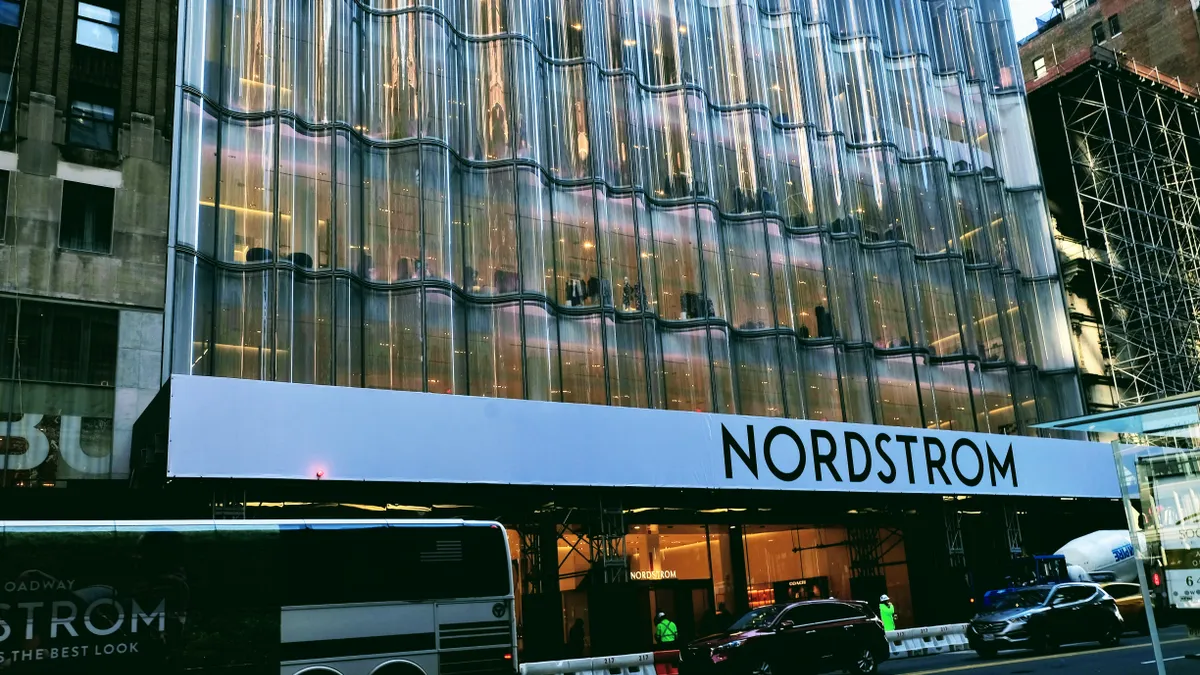Dive Brief:
-
Nordstrom on Monday stated that its board of directors and co-Presidents Pete and Erik Nordstrom said that they had "terminated by … mutual agreement" a proposal that "certain members of the Nordstrom family" would boost their share of common stock from about 31% to slightly more than 50%, according to a filing with the Securities and Exchange Commission.
-
The notice puts to rest any notion that the family would retake firm control of the business, something they had also attempted two years ago with a take-private offer that the board last year eventually deemed insufficient.
-
The board and the Nordstrom brothers, great-grandsons of the company's founder, "over the past several months" have also discussed "succession planning and the continued evolution of their and others' management roles and responsibilities with the goal of ensuring that the Company is well-positioned to execute on its strategic plan and develop senior management and leadership," according to the filing.
Dive Insight:
Obtaining a controlling interest would have afforded the Nordstroms — already innovative department store retailers — the kind of time and space that can be difficult to come by as public investors clamor for growth on a quarterly basis.
Monday's document also notes that, as part of its review of senior leadership, the company recently created two new roles, chief merchandising officer (appointing company veteran Teri Bariquit) and chief operating officer (appointing former digital chief Ken Worzel) — both non-family members. That came after the untimely death in January of third Nordstrom brother and co-President Blake Nordstrom, who had been hailed as a talented retailer.
It's not clear whether the succession planning mentioned in the filing might ultimately entail a restructuring of top management, which has had the Nordstrom brothers as co-presidents in place of a chief executive. The SEC notice comes just days after the department store opened its first full-line location in New York City, shortly after also opening two merchandise-free Local stores there.
Despite its best efforts, the company has struggled of late. Its last quarter saw net sales decline 5.1% year over year, with full-price net sales down 6.5% and even normally well-performing off-price net sales down 1.9%. Total company digital sales increased 4% and were 30% of the business, the company said. Its focus on apparel and footwear has been a weakness as consumer spending on apparel has diminished, and UBS analysts earlier this year deemed Nordstrom "a no-growth retailer."
The department store no longer reports store comps in light of the blurring of on and offline sales channels, and that could be seen as one way to diminish the Wall Street glare. Some analysts view that policy as possibly a reflection of poor performance, however.
"Most retailers do already include digital in comparable sales. Comparable is most often all online sales plus the sales of stores that have been open for a year or more," GlobalData Retail Managing Director Neil Saunders told Retail Dive in an email. "Some retailers, like Target and Walmart, provide a breakdown of the contribution of online and stores to the comparable number so the success of each channel can be assessed. Nordstrom know this full well and if their concern was clarity they could provide more detail, not less. In my opinion, the reason they don't break out comparable sales is because they are really poor and make the company look bad."
However, the measure of comps isn't "the be-all and end-all," he also said. "There is sometimes an obsessive focus on them and they have to be viewed in the context of a lot of other trading variables."
If the family had been successful in its effort to regain a firmer grip on the tiller, reports of that or other metrics wouldn't be as closely scrutinized, however, and may have allowed them to forge a longer-term growth strategy. Even under the full spotlight of Wall Street, the company has demonstrated keen interest in experimentation, including a tech-quisition strategy that has helped it reach new customers, refine its merchandising and explore cutting-edge retail concepts.
That includes in-store pop-ups to feature emerging brands and merchandise-free "Local" shops that the family in New York last week said will expand to its top markets after launching in Los Angeles and New York. Nordstrom also runs HauteLook and Trunk Club and was an early investor in Shoes of Prey and Bonobos, the latter of which has since been acquired by Walmart and may have provided the blueprint for its Local effort.















